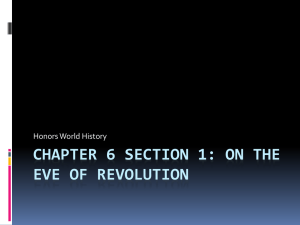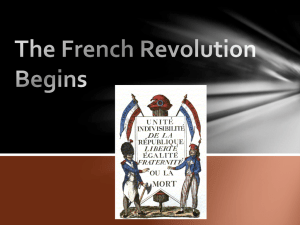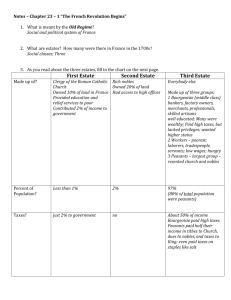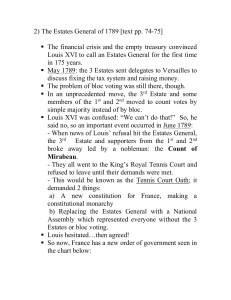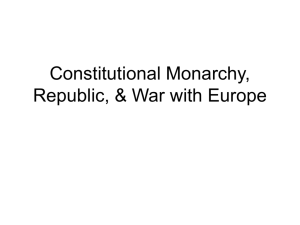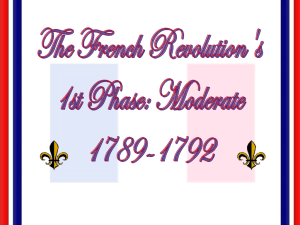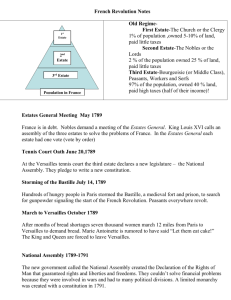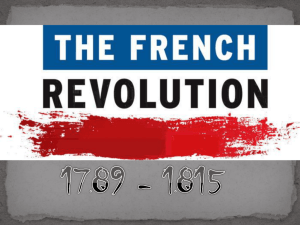France on the Eve of Revolution
advertisement
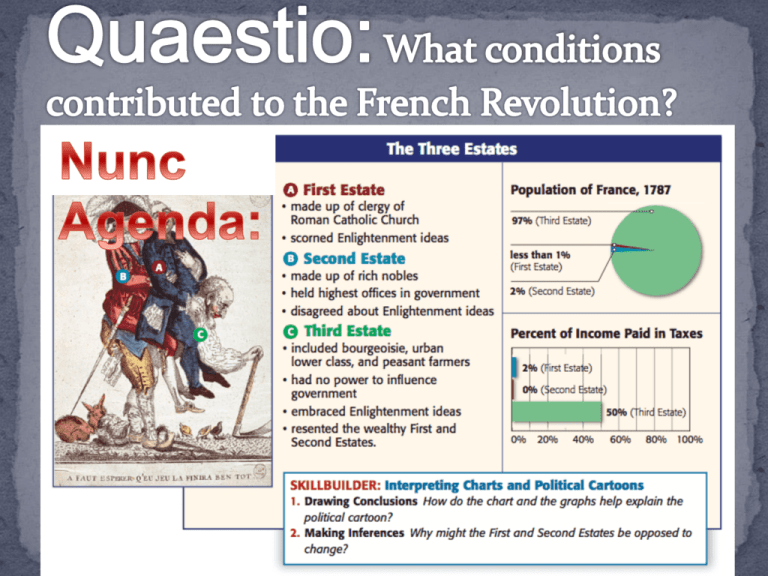
Ancien Régime: French social system based on Medieval Feudalism First Estate = Clergy Owned 10% of French Land and collected Tithes (10% religious tax for Church) but paid no direct taxes to the state High level clergy like bishops usually came from noble families, often acted as such Second Estate = Nobility Descendants of Wealthy Land-Owning Medieval Lords King Louis XIV had crushed their military power and made them subservient to the King, but had given them privileges to please them, such as key positions in government and military and freedom from taxation They had already lost much of their former power, and feared losing more of it to the wealthy and educated members of the Third Estate, with whom they competed for key positions Third Estate = Everyone Else Although artificially grouped together as “commoners,” the Third Estate was very diverse Bourgeoisie = Top of the Third Estate, wealthy and educated “Middle Class” composed of bankers, merchants, manufacturers, doctors, lawyers, and other professionals who resented their lower official status and lack of political power despite their actual socioeconomic level Third Estate = Everyone Else The majority was composed of poor urban workers and rural peasants who were responsible for paying all the taxes, which were often excessive and, for the poorest members of society, impossible to pay In, France lost the Seven Years War to the British, which left the government with enormous debts Enlightenment philosophy had become popular among the bourgeoisie, who began to call for changes to the government, increased political participation, and greater equality The example of the American Revolution inspired the French people by showing them that it was possible for the people to take control from the established powers The French military support for Americans against the British created even greater debt Population was on the rise in France, while at the same time, environmental changes caused several years of poor harvests leading to serious food shortage, which led to rise in prices Bread was the staple of commoners, with families consuming 3-4 loaves per day, costing at least half of their wages, and when the bread prices doubled in 1789, riots broke out The Kings of France continued to borrow money and increase debt to fund their lavish lifestyles When the weak Louis XVI became king, his financial advisor told him to reduce spending for the court and begin taxing the nobles and clergy, but they forced the king to fire him His wife, Marie Antoinette, was hated by the French people because she was Austrian (France’s former enemies) and because she wasted money on gambling and luxuries, earning the nickname “Madame Deficit” When Louis XVI finally decided to tax the nobles, they forced him to call a meeting of the Estates General, which had not met in 175 years so they could vote against his tax In 1789, Delegates representing the three estates met in Versailles to deal with the crisis Third Estate was represented by Enlightenment-inspired Bourgeoisie who complained of the abuses of the first two estates and demanded political reform However, the voting system gave each estate a single vote, despite the fact that the Third Estate was 97% of the population, meaning the first and second estates would always win In protest, the Third Estate delegates declared themselves the National Assembly representing the people of France, with the right to make laws for the country Louis had them locked out of the meeting space, so they relocated to an indoor tennis court, along with a few of the nobles and clergy who supported them, and took the Tennis Court Oath, swearing to stay until they had written a new constitution for France Louis claimed to accept the Assembly, but when he started moving troops into Paris, the people feared he would use force to restore his power On July 14, 1789, mobs of hundreds of Parisians began gathering weapons, and came to the Bastille, a medieval fortress used as a prison, demanding gunpowder When the guards refused and fired on the crowd, the mob broke in, took over the building, and killed all the guards, parading through the streets with their heads on pikes The Storming of the Bastille became a symbol of the Revolution, as the prison represented the Medieval tyranny of the old order, and is celebrated today as a national holiday, Bastille Day, in France Working together in three groups, create speeches calling for change and reform, or arguing against it, from the perspective of one of three groups in France on the Eve of Revolution, either the Nobles, the Bourgeoisie, or the Poor Workers and Farmers. Use specific examples to support your positions, and tailor your concerns to your social group. Try to persuade others to agree with you and support you.

